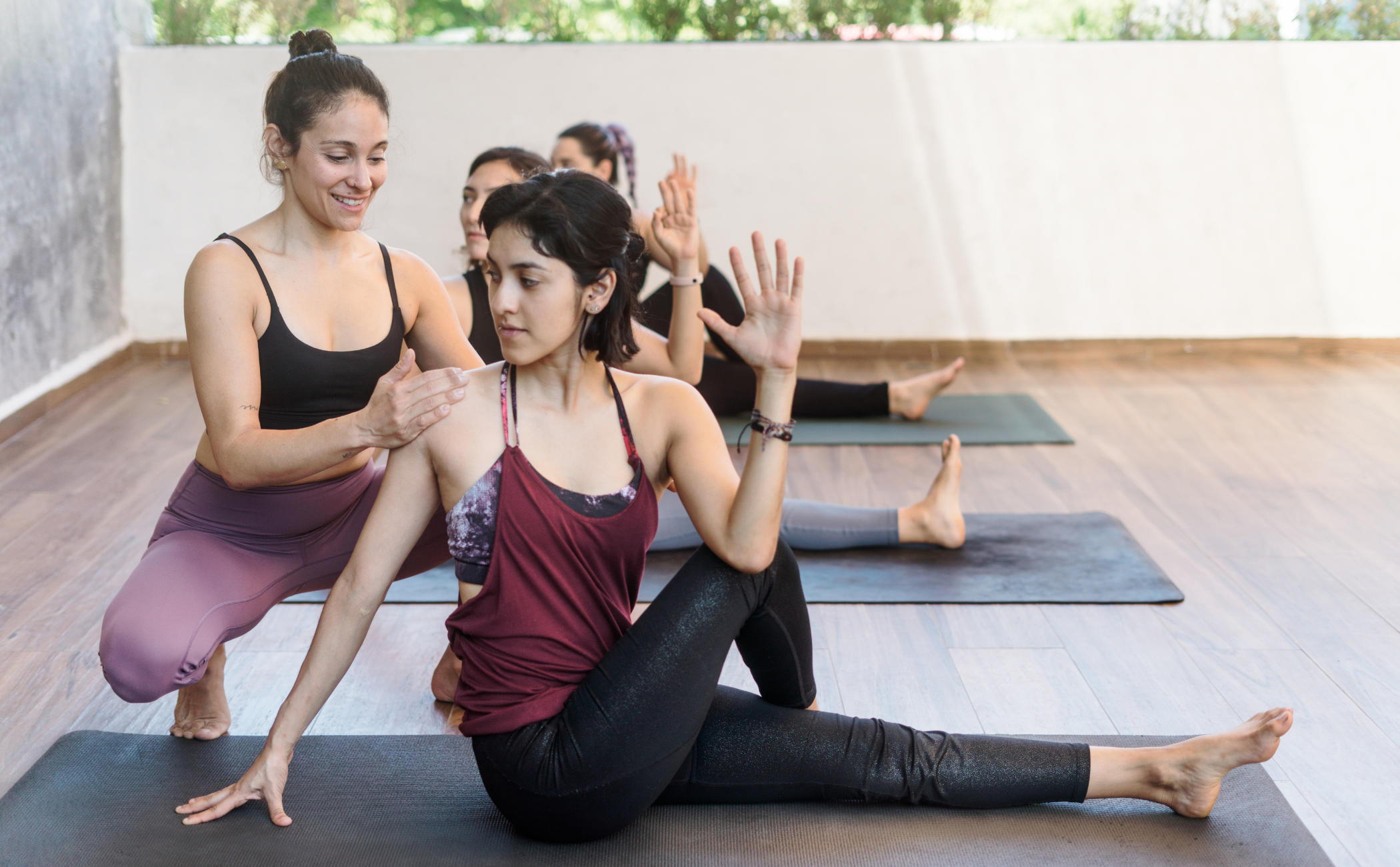Kabaddi for Students is an electrifying, fast-paced sport that has captivated millions with its fusion of strategy, strength, and agility. Rooted in tradition and played for centuries, kabaddi still carries an unmatched appeal, especially among students seeking physical and mental development. But it’s more than just a game — kabaddi is a consistent test of boldness and courage, traits every student can benefit from in their daily lives.
This action-packed sport is more than grappling opponents. It’s a discipline that sharpens the mind, strengthens the body, and nurtures essential life skills. For students, kabaddi opens the door to self-discovery, challenges comfort zones, and instills confidence. It’s an avenue to not only grow physically fit but also mentally resilient. Undoubtedly, Kabaddi for Students is the bridge between fun and personal growth.
Through this blog, you’ll uncover why students should hop onto the kabaddi field, the amazing mental and physical advantages it offers, how it forges teamwork and boldness, and practical tips to get started. Buckle up, as kabaddi might be the game that shapes your personality and prepares you to face life with determination.
Why Kabaddi is Great for Students:

Kabaddi for Students is an all-encompassing sport that holds relevance in a student’s life. The benefits stretch across physical fitness, mental toughness, and even interpersonal growth. Here’s why it stands out as a game students should consider:
Physical Benefits:
Kabaddi is one of the most physically demanding sports out there. It’s not just about tagging the opposing team; it requires rapid reflexes, strength, and endurance.
- Improves Strength and Agility: Kabaddi for Students involves tackling opponents, which builds significant muscular strength. The constant change in direction and quick movements fine-tune agility, balance, and coordination, making students more athletic and agile in day-to-day activities.
- Boosts Cardiovascular Health: With its high-intensity pacing, Kabaddi for Students ensures players work up a sweat. This improves cardiovascular endurance and strengthens heart health, equipping students to maintain an active lifestyle.
- Overall Fitness: Kabaddi employs the whole body, working on core stability, flexibility, and stamina. It’s a fun yet effective workout that keeps students fit without the monotony of regular gym sessions.
Mental Benefits:
While its physical advantages are hard to ignore, Kabaddi for Students also paves the way for mental growth and clarity.
- Enhances Decision-Making: Each second in Kabaddi for Students involves critical thinking, whether it’s judging the right time to raid or defending with precision. Students hone their decision-making skills, which proves invaluable during exams or real-life dilemmas.
- Improves Focus Under Pressure: High-pressure moments in Kabaddi for Students force players to concentrate despite distractions. This skill translates well into academics, where focus often makes all the difference.
- Builds Confidence: Kabaddi for Students pushes students to take calculated risks. From planning attacks to successfully escaping a tackle, every win boost self-confidence, helping them believe in their abilities.
By combining physical vigor with mental strength, Kabaddi for Students provides a holistic approach to wellness and self-growth, marking it as more than just a game.
Fostering Boldness and Teamwork:
One of the most remarkable aspects of Kabaddi for Students is its ability to foster boldness and teamwork. This dynamic sport forces players to challenge themselves and rely on teammates, creating a unique balance between individual courage and collaborative spirit.
Cultivating Boldness:
One of the most remarkable aspects of Kabaddi for Students is its ability to foster boldness and teamwork. This dynamic sport forces players to challenge themselves and rely on teammates, creating a unique balance between individual courage and collaborative spirit.
- Stepping Out of Comfort Zones: Students often hesitate to face challenges. Kabaddi for Students teaches them to confront fears, whether it’s going head-to-head with a strong opponent or strategizing to break the opponent’s chain.
- Resilience Through Challenges: Nobody wins every time, and Kabaddi for Students underlines this reality. By encouraging players to learn from setbacks and rebound, it builds resilience that applies far beyond the field.
Boldness earned on the kabaddi court often spills over into academics, relationships, and future challenges, helping students rise to any occasion with determination and grit.
Strengthening Teamwork:
Kabaddi for Students isn’t a solo sport; it thrives on collaboration. Each move requires trust, communication, and collective effort.
- Connecting with Teammates: From defending in a cohesive chain to strategizing raids, teamwork is integral throughout Kabaddi for Students. Students learn to value collaboration, where every individual contributes toward a common goal.
- Instilling Trust and Communication: Success in Kabaddi for Students hinges on effective communication. Players must rely on each other not only for defensive support but also to execute complex strategies. This reinforces trust and enhances interpersonal relationships.
Through Kabaddi for Students, young players get a hands-on experience of what strong teamwork looks like, a skill that will serve them well in any environment.
Practical Tips for Getting Started in Kabaddi:

If you’re intrigued by Kabaddi for Students and ready to give this high-energy sport a shot, you might be wondering where to begin. Starting something new can feel overwhelming, but this quick guide will break it down into simple, actionable tips. With the right approach, you’ll build confidence and skills in no time. Here’s how students can get involved in kabaddi:
Learn the Basics of Kabaddi:
Understanding the fundamentals is critical for anyone interested in kabaddi. Mastering the rules, strategies, and important details will help students get the most out of this exhilarating sport. Kabaddi for Students is not just about playing—it’s about knowing the game inside out.
Rules and Objectives:
Kabaddi is played between two teams with an exciting objective: send the raider into the opposing team’s court to tag as many defenders as possible and return to their half—all without being caught. On the defensive side, the goal is to prevent the raider from returning safely to their team. Knowing this basic flow is essential for students starting their kabaddi journey.
Positions and Player Roles:
Every player on a kabaddi team has a specific role. Understanding these roles helps students figure out where they would fit best on a team. Raiders are the attackers, entering the opponent’s territory to score points, while defenders guard their side and attempt to stop the raider. For beginners, identifying personal strengths will make it easier to choose and excel at a position.
Game Terminologies:
Kabaddi has its own unique set of terms. Familiarity with words like “raid,” “bonus point,” “super tackle,” and “lona” will help you better comprehend gameplay while refining your strategies. These small but critical terms are what make Kabaddi for Students more comprehensible and fun to engage with.
A great way to get started is by watching kabaddi matches—whether through local leagues, school competitions, or professional games. Online platforms, like YouTube, also host excellent tutorials for beginners. Observing professional players offers insight into tactics, movement, and strategies.
Join a Local Team or Club:
Getting involved with a team is one of the best ways to develop your skills in kabaddi. Kabaddi for Students thrives on teamwork and collaboration, which is why becoming part of a group is so beneficial.
School or College Teams:
Many schools and colleges have kabaddi included as part of their extracurricular sports programs. Students can join their school teams to receive structured training while developing camaraderie with teammates. Additionally, having access to a coach makes it easier to master complicated techniques.
Community Groups:
For students whose schools might not have a kabaddi program, local communities often host clubs or weekend leagues. These are great alternatives for learning kabaddi through regular practice. Community teams offer a sense of belonging while fostering physical and tactical growth in the game.
Club Benefits:
Joining a team or club isn’t just about practice. It’s an opportunity to seek feedback from experienced players, build confidence, and learn to play collaboratively. Kabaddi for Students in this format also opens doors to a greater support network, making the overall experience enriching.
Build Physical Stamina and Strength:

Kabaddi is as much about physical agility as it is about mental sharpness. Building fitness is pivotal for tackling the game’s intense pace. Kabaddi for Students serves as an excellent means to achieve long-term physical well-being while preparing them for competitive gameplay.
Cardio Routine:
To maintain high performance during an adrenaline-pumping game, students must focus on endurance. Activities such as jogging, sprinting, skipping rope, or cycling build cardiovascular health, ensuring players don’t tire out during critical moments.
Strength Training:
Physical power is key in kabaddi, especially when tackling opponents. Exercises like push-ups, planks, lunges, and squats are great to strengthen the core, arms, and legs, giving players the edge they need during intense situations.
Flexibility and Agility:
One of kabaddi’s most demanding aspects is the need for sudden movements. Flexibility exercises, such as yoga, combined with drills that improve quick reflexes, help players manoeuvre swiftly during raids and tackles.
Balance Practice:
A lot of kabaddi involves players leaning on one leg while raiding or dodging tackles. Practicing balance-focused exercises, like standing on one foot or using a stability ball, builds this crucial skill. Kabaddi for Students teaches not just team-based strategies but the importance of individual fitness.
Commitment to regular training—about 30 minutes to an hour daily—can significantly improve performance and confidence on the field.
Attend Workshops or Training Camps:

For students ready to take kabaddi seriously, workshops and training camps are fantastic avenues to enhance both foundational and advanced skills.
Start from the Fundamentals:
Many training camps focus entirely on beginners, which makes them ideal for students new to kabaddi. Coaches often emphasize skills such as effective raiding, defensive chains, and dodging techniques, helping participants grasp the core elements of the game.
Learn from Experts:
Workshops led by professionals provide students with insider tips and tricks that go far beyond the rules. Kabaddi for Students takes on a whole new dimension when taught by experienced players who understand the intricacies of strategic gameplay.
Network and Confidence Boost:
Participating in workshops also comes with the benefit of building connections. Students meet like-minded enthusiasts who share their goals and dedication, turning training camps into highly motivating experiences.
Explore local sports centers or online directories for kabaddi-specific camps near you. These short-term, focused sessions can make a significant impact, teaching participants to perform confidently on the court.
Practice Regularly with Friends or Peers:
Nothing beats regular practice when it comes to mastering kabaddi. Kabaddi for Students is not only about competition but about consistent learning and gradual improvement.
Informal Matches:
Gather friends or classmates to organize informal kabaddi matches at school grounds or parks. These casual games are excellent for practicing raids, tackles, and dynamic movements without added pressure.
Drills and Technique Development:
Start with practical drills tailored to specific scenarios. For instance, set up exercises to practice tagging opponents, perfecting lunges during raids, or defending against chain tackles. These drills enhance both physical and tactical skills.
Communication and Team Coordination:
Kabaddi requires seamless communication among teammates. Use informal games to improve coordination by planning defensive and offensive strategies. Learning each other’s playing styles makes gameplay smoother and more effective.
Evaluate and Adapt:
After every practice session, reflect on areas that need improvement. Whether it’s strategizing better or boosting stamina, consistent evaluation helps students grow steadily. Kabaddi for Students instills the value of continuous self-improvement, an essential skill beyond the sport itself.
With dedication, regular practice, and a supportive team, students not only improve technically but also build the confidence to face challenges boldly. By following these steps, kabaddi becomes a source of fun, fitness, and personal growth.
Stay Consistent and Motivated:
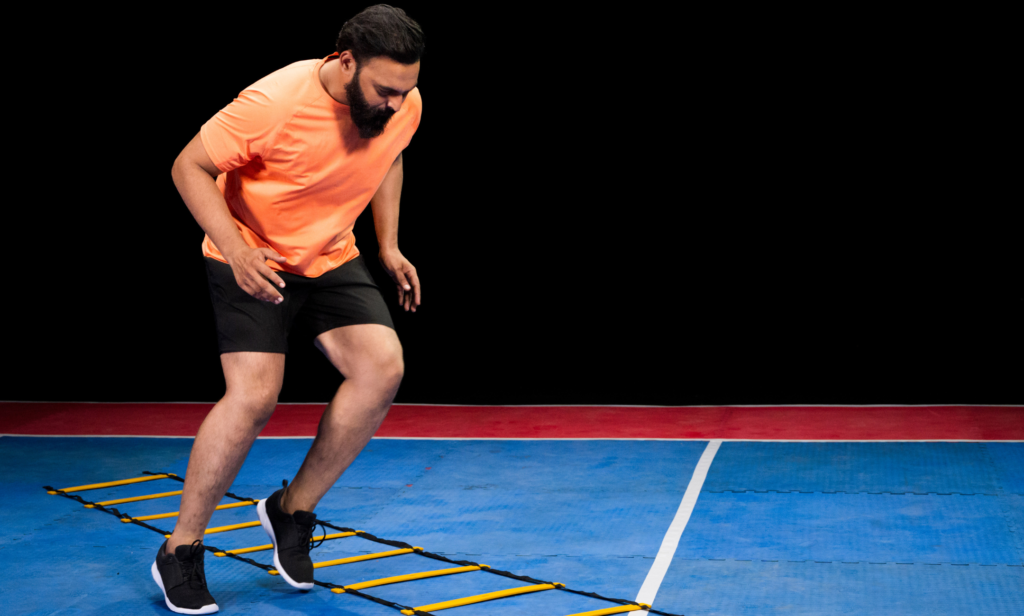
Starting something new, especially a sport like kabaddi, can be challenging at first. However, staying consistent will ensure steady growth. Kabaddi for Students is all about persistence, and students can stay on track with these tips:
- Set Goals: Setting measurable and realistic goals, such as completing your first raid successfully or dedicating a number of hours per week to practice, keeps motivation high. Kabaddi for Students encourages young learners to aim for progressive milestones as they grow in the sport.
- Celebrate Progress: It’s crucial to acknowledge every small win. Whether you’ve improved your stamina or mastered defensive techniques, celebrate those steps forward. Kabaddi for Students emphasizes appreciating progress as a means to keep enthusiasm alive.
- Keep It Fun: Despite its intensity, kabaddi is meant to be enjoyed. Keeping light-hearted and fun practice sessions ensures that kabaddi doesn’t turn into a chore for students. Kabaddi for Students thrives on maintaining a balance between skill development and enjoyment.
By following these strategies, any student can take their kabaddi skills to the next level. All it takes is dedication, a willingness to learn, and an eagerness to step onto the field of play.
Famous Kabaddi Players and Their Achievements:
Pardeep Narwal (India):

- Known as the “Dubki King,” he is the highest raid point scorer in Pro Kabaddi League (PKL) history with over 1800 points.
- Achievements: Three consecutive PKL titles with Patna Pirates, gold medal at the 2019 South Asian Games, and multiple MVP awards.
Anup Kumar (India):

- Nicknamed the “God of Kabaddi,” he captained India to gold medals at the 2010 and 2014 Asian Games.
- Known for his strategic raiding and leadership skills.
Fazel Atrachali (Iran):

- Regarded as the best defender in PKL history with over 400 tackle points.
- Achievements: Captained Iran to victory at the 2018 Asian Games, defeating India in the semi-finals.
Ajay Thakur (India):

- Known as the “Ice Man,” he led India to victory in the 2016 Kabaddi World Cup and 2014 Asian Games.
- Awards: Padma Shri and Arjuna Award for his contributions to kabaddi.
Pawan Sehrawat (India):

- Known as the “High Flyer,” he holds the record for the most expensive player in PKL history.
- Achievements: Gold medals at the 2019 South Asian Games and 2023 Asian Kabaddi Championship.
Naveen Kumar (India):

- Nicknamed the “Naveen Express,” he is one of the youngest stars in kabaddi.
- Achievements: MVP awards in PKL seasons 7 and 8, and gold medals at the 2019 South Asian Games and 2023 Asian Kabaddi Championship.
Mohammadreza Shadloui Chiyaneh (Iran):

- Known for his incredible defensive skills, he has quickly become a force in the Pro Kabaddi League (PKL).
- Achievements: Two PKL titles and a key player for Iran’s national team, contributing to their success in international tournaments.
Jang Kun Lee (South Korea):
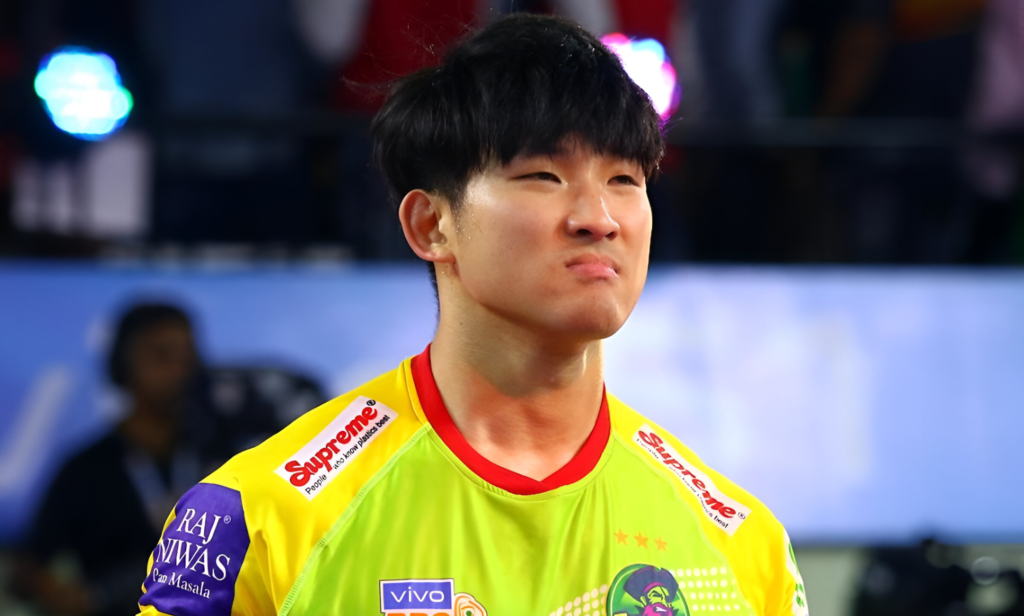
- One of the most prominent South Korean kabaddi players, known for his agility and raiding skills.
- Achievements: Played a crucial role in South Korea’s victory over India in the 2016 Kabaddi World Cup group stage.
Meraj Sheykh (Iran):
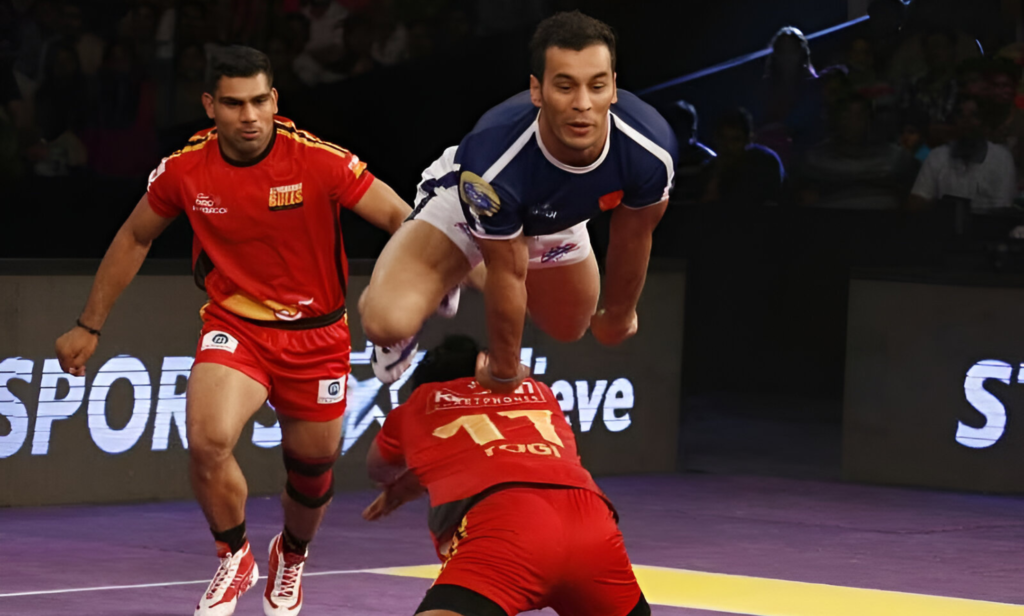
- A versatile all-rounder, he is known for his unique raiding style and leadership.
- Achievements: Captained Iran in multiple international tournaments and played a pivotal role in their 2018 Asian Games gold medal win.
Abozar Mohajermighani (Iran):
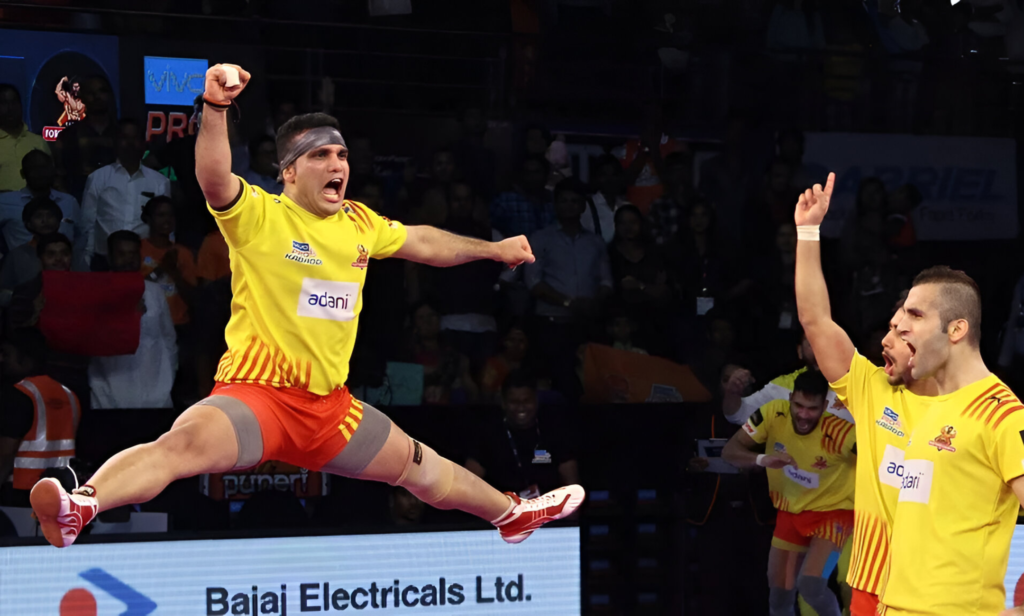
- A strong defender, famous for his ankle holds and aggressive tackles.
- Achievements: Represented Iran in the 2018 Asian Games and has been a standout player in the PKL.
Hadi Oshtorak (Iran):
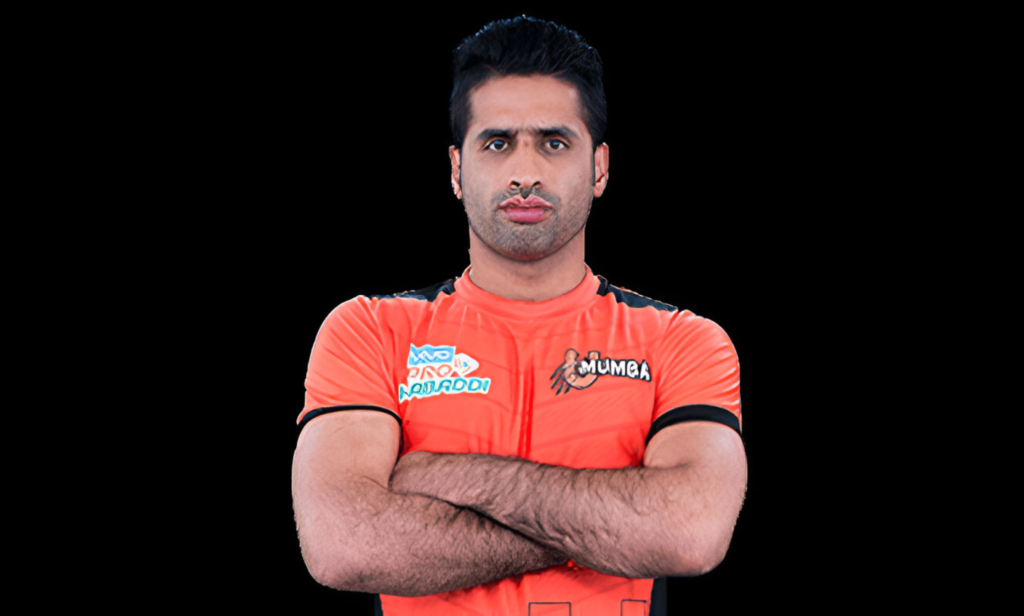
- Known for his all-round abilities, he has been a consistent performer in both international and league matches.
- Achievements: Played a key role in Iran’s success at the 2018 Asian Games and has been a part of multiple PKL teams.
Dong Geon Lee (South Korea):

- A rising star in kabaddi, known for his speed and precision in raids.
- Achievements: Represented South Korea in the 2016 Kabaddi World Cup and has been a valuable player in the PKL.
Masayuki Shimokawa (Japan):
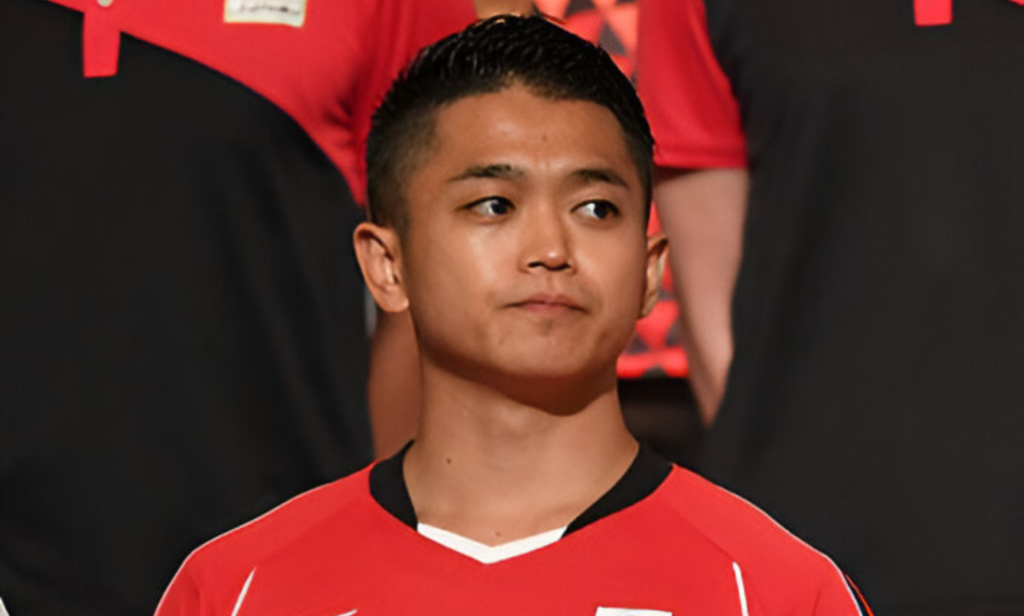
- A prominent figure in Japanese kabaddi, known for his strategic gameplay.
- Achievements: Played a key role in Japan’s growing presence in international kabaddi tournaments.
Fitness Secrets of Kabaddi Players:
- Diet
- Kabaddi players follow a high-protein, low-spice diet to maintain energy and stamina.
- Common foods include eggs, oats, milk, fruits (especially apples), and traditional Indian dishes like dosa and idly with sambhar.
- Workout Regimen
- Morning sessions include jogging, stretching, and kabaddi-specific drills to improve mental stability and agility.
- Strength training focuses on core exercises like planks, squats, and push-ups.
- Evening sessions emphasize team strategies and combinations.
- Recovery
- Players relax in swimming pools post-training to soothe muscles.
- Regular massages and physiotherapy sessions help prevent injuries.
- Match Day Preparation
- Light training sessions focus on strategy and skill refinement.
Players ensure proper hydration and nutrition to stay match-ready.
These players exemplify how dedication to fitness and strategy can lead to success on the international stage. Let me know if you’d like a detailed article or further insights!
Frequently Asked Questions
Why is kabaddi a good choice for students?
Kabaddi is an excellent sport for students because it improves physical fitness, mental focus, and teamwork skills. It’s a high-energy activity that helps students stay healthy, develop confidence, and step out of their comfort zones. Additionally, kabaddi is relatively low-cost and easy to start, making it accessible to many.
How can kabaddi help students stay fit?
Kabaddi requires quick movements, strength, and stamina, making it a full-body workout. It strengthens muscles, improves cardiovascular health, and builds agility. Spending even a few hours playing kabaddi each week can keep students in great shape while also being a fun alternative to a gym workout.
Does playing kabaddi improve mental health?
Yes, kabaddi can boost mental health. The game demands focus, quick decision-making, and strategic thinking, which sharpen cognitive abilities. It also reduces stress by releasing endorphins (happy hormones) during gameplay, leaving students feeling refreshed and positive.
How does kabaddi contribute to character-building for students?
Kabaddi fosters key character traits like resilience, courage, and teamwork. Players learn to handle pressures during raids and tackles while trusting their teammates for support. Overcoming challenges on the kabaddi court translates into life skills, helping students build confidence and mental toughness.
Is kabaddi time-consuming? How can students balance academics and sports?
Kabaddi doesn’t have to take up too much time. Students can dedicate 2-3 practice sessions per week, each lasting about 1-2 hours, and still experience its benefits. Planning a schedule that balances classes, study time, and kabaddi practice ensures nothing gets neglected.
What equipment is needed to start playing kabaddi?
Kabaddi doesn’t require expensive equipment. All you need is a safe playing area (a court or open ground), comfortable athletic wear, and a good pair of sports shoes. This simplicity makes kabaddi a budget-friendly sport for students.
How do I join a kabaddi team as a student?
Start by checking if your school or college has a kabaddi team or club. If not, reach out to local sports academies or community groups that offer kabaddi training. Participating in informal matches with friends is also a great way to practice and gain confidence.
Can kabaddi help students manage stress?
Absolutely! Kabaddi is an intense physical activity that releases built-up energy and stress. It improves mood and focus, giving students a mental break from their studies. Regular kabaddi sessions can help maintain a healthy work-life balance.
What life skills can students gain from kabaddi?
Kabaddi teaches students teamwork, leadership, communication, and quick thinking. Facing opponents requires bravery, while coordinating with teammates sharpens collaboration and trust. These skills positively impact both personal and academic life.
Is kabaddi inclusive for all fitness levels?
Yes! Kabaddi accommodates players of all fitness levels. Beginners can start with simple drills and gradually build their stamina and skills. Coaches and teammates are usually supportive, making it easier for newcomers to feel included and improve with time.
What are the common challenges of playing kabaddi for students?
Some challenges include maintaining fitness levels, avoiding injuries, and balancing the time commitment with academics. However, with proper warm-ups, attentive coaching, and careful planning, these challenges can be easily managed.
Can kabaddi be played in small spaces?
Certainly! While official matches need a standard-sized court, kabaddi can also be played in smaller spaces for practice or fun. This flexibility makes it ideal for school playgrounds, local parks, or even smaller fields.
Is kabaddi only for boys, or can girls play too?
Kabaddi is for everyone! Many girls and women excel in kabaddi at both amateur and professional levels. Schools and communities are increasingly encouraging girls to take up the sport, offering them equal opportunities to shine.
What habits can students adopt to become better kabaddi players?
To improve in kabaddi, students should focus on regular exercise, good nutrition, adequate rest, and practicing game strategies. Simple habits like morning workouts, eating balanced meals, and staying hydrated can make a big difference in their performance.
Does kabaddi benefit students academically?
Yes, kabaddi improves focus, discipline, and time-management skills that are crucial for academic success. Taking part in sports like kabaddi can help students refresh their minds, making it easier to return to studies with increased energy and concentration.
Are there any career opportunities in kabaddi?
Absolutely! Pro Kabaddi League (PKL) and national teams offer professional opportunities for talented players. With dedication and consistent practice, students can make a career out of kabaddi, inspiring others while pursuing their passion.
How can kabaddi build better social connections for students?
Kabaddi is a team sport that thrives on collaboration and communication. By playing kabaddi, students bond with their teammates, make new friends, and learn the importance of working together toward common goals.
What can students expect during their first kabaddi training session?
The first session usually involves warm-ups, basic drills, and an introduction to rules and strategies. Coaches assess the players’ fitness and skills while guiding them on techniques like raiding, tackling, and dodging. It’s a mix of learning and fun.
Do students need to excel in sports to play kabaddi?
Not at all! Kabaddi welcomes all skill levels. It’s designed to help students discover their strengths, grow their abilities, and develop a love for sports, regardless of their prior experience.
Why should students consider kabaddi as a lifestyle choice?
Kabaddi isn’t just a sport; it’s a way to build a healthier, more confident, and connected lifestyle. It challenges body and mind while teaching resilience, teamwork, and discipline — qualities that extend far beyond the kabaddi court into every aspect of life.
Kabaddi can be the perfect blend of fitness, fun, and personal growth for students eager to explore their potential!
CONCLUSION:
Kabaddi for Students serves as a metaphor for courage, resilience, and teamwork — all of which are essential life skills. For students, the sport is a brilliant opportunity to step out, engage mentally and physically, and harness the potential that lies within.
Take that bold first step by giving Kabaddi for Students a shot. Whether you’re gearing up for tournaments or simply playing for fun, the game will shape not just your body and mind but also your approach to life. Kabaddi for Students is a sport that mirrors life’s challenges and prepares you to tackle them with unwavering boldness.
“Kabaddi for Students” is much more than a catchy phrase; it encapsulates the promise that kabaddi holds for young minds. It is a thrilling game, yet beneath the adrenaline lies a powerful impact on character-building and self-discovery.
Gear up, gather your teammates, and experience the sheer joy, resilience, and teamwork that Kabaddi for Students brings to the table. It’s time to be bold, be relentless, and above all, be in action. The world of Kabaddi for Students awaits you.



